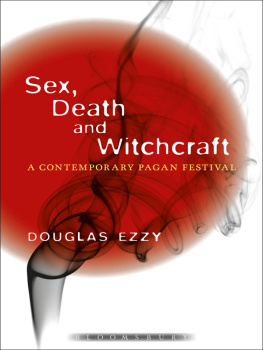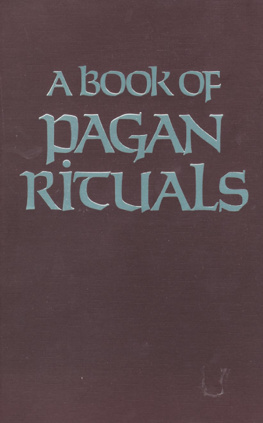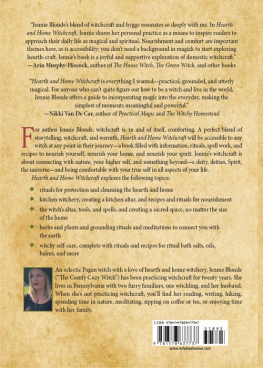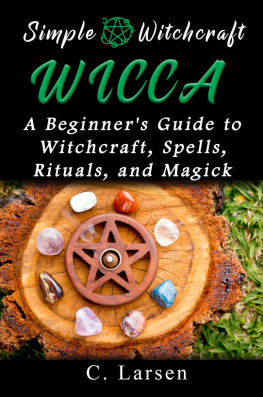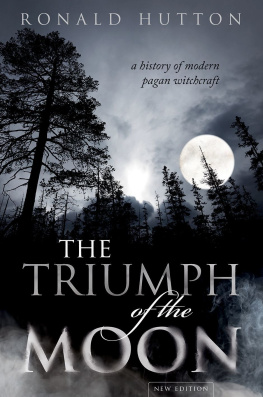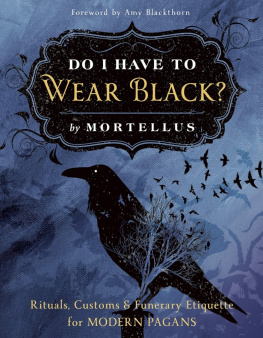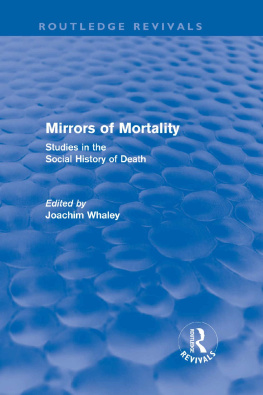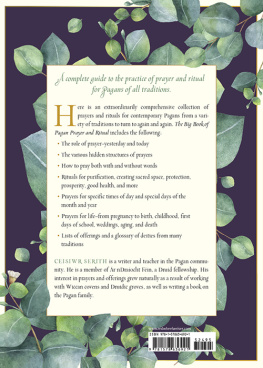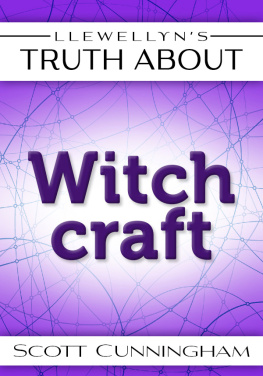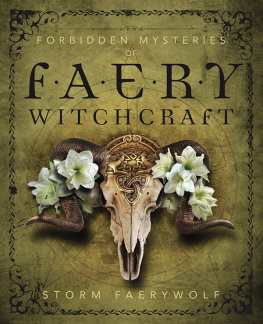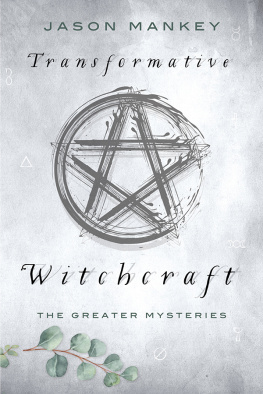Sex, Death and Witchcraft
Other titles from Bloomsbury
Ritual: Key Concepts in Religion, Pamela J. Stewart and Andrew J. Strathern
PB: 978-1-44118-569-3
HB: 978-1-44113-729-6
Death, Ritual, and Belief, Douglas J. Davies
PB: 978-0-30433-822-1
Myth: Key Concepts in Religion, Robert Ellwood
PB: 978-1-84706-235-2
HB: 978-1-84706-234-5
Sex, Death and Witchcraft
A Contemporary Pagan Festival
DOUGLAS EZZY

CONTENTS
To the participants of Faunalia. This is for you. Thank you for your generosity and courage. In particular, thanks to those who shared their stories with me in a formal interview.
To Kira, without whom this would not be.
To Hawthorn and Seline. Respect and gratitude.
To Emily, Tim and Jill. You help me find a life with soul.
To Ruth Sansom, who was one of the first to guide me in understanding mystical experience. I honour you as an ancestor.
Thanks to my academic colleagues who helped me see there was something important to say, and helped me find the courage to say it. They shared their homes with me, invited me to speak at their universities and contributed in various other ways: Graham Harvey, Adrian Harris, Jone Salomonsen, Grant Potts, Chas Clifton, Jenny Blain, Robert Wallis, Susan Greenwood, Sara Pike, Marianne Lien, Ute Huesken, Robert Puckett, Nikki Bado, Shawn Arthur, Lynne Hume, Andrew Francis, Kathleen McPhillips, Carole Cusack, Gary Bouma, Rowan Ireland, Garry Deverell, James Collins, Helen Collins, Anna Halafoff, Julia Verdouw, Morgan Leigh, Katie Wright and Kesherie Gurung. Thanks to Sam Peek, Sean Scullion and the crew of PA Tas for being an inspiration to me. Thanks to Edan Mumford, Philippe Duquesnoy, B. Dalton, Seline, Michelle Maddern, Gavin Andrew, Hawthorn, Sean Scullion, Vinde, Pan, Danny and Tania LeNoir, for permission to use the photos in the book. Thanks to my academic mentors: Allan Kellehear and Gary Easthope. Thanks to those who, for various reasons, I cannot name.
Thanks also to the University of Tasmania, which granted me two periods of study leave during which the vast bulk of the work was conducted for this book.
An earlier version of
Harrison: We built this monster bonfire, 20 feet high. The ritualists are up the top of the hill. The whole hill is covered in fog. We light the fire and it just blazes. That is the signal for everyone to come up. Hatty is leading [the procession of the participants coming up the hill]. We can hear the drums start, and then we hear them get louder and louder. We hear the excitement and the chanting. We are really hyped up because we can hear boom, boom, boom, boom, boom, boom. Ooohhh, hhhooo, the sabbat is coming.
Phoebe: The beats of the drum were like my heart. I was almost able to feel everyones excitement, the anticipation of it all. I was no longer I. I was something so great that I do not have words. Did it blow my mind? It blew my mind. Did it blow every inch of me? It totally did. The craziness, the chaos and the confusion. The sitting and appreciating people being very sensual with each other. I sit and I watch and observe. The energy is spiralling, and spiralling, and spiralling. It was very animalistic. It was very primal. It was a world between worlds. Looking in the trees and you can see faces looking back at you, energies that are not of this world. I do not have the words. The feelings, the excitement, I can see it. I am looking at you but I can see it. Oh [sighs].
Beating drums accompany the participants as they approach the hill. In the dark of night their path is lit by a full moon. The air is still. Through the fog they can see their destination: a massive bonfire. A black-robed priestess stands silhouetted against the flames. Emerging from the forest Eventually Baphomet appears. Baphomet is unforgettable: the black wings, the goat mask, the torch burning between the goats horns. Baphomet does not speak. Baphomet communes directly with peoples hearts with a sigh, a held hand, a caress. Ritual wine is shared as the rite transforms from a scripted performance into an ecstatic communal dance lasting into the small hours of the morning. People sit by the fire, rotating to keep warm against the freezing cold night air. As dawn approaches they gradually drift off to bed in bunkhouse accommodation down the hill.
Baphomet is a window into a hidden world. This world is not only hidden on remote hilltops or in Pagan rituals, but deep in peoples hearts. It is hidden because it is both feared and desired. People are afraid of what might happen if it is allowed into the open. Fearful echoes of otherworldly demons unsettle those who approach Baphomet. Desire draws participants towards Baphomet, struggling against restraint and guilt. The ritual provides a passage into this hidden world, into the presence of Baphomet, and then safely returns participants to everyday life and normality. The ritual forges courage and trust. Participants dance naked. Fire and passion keep them warm. Respect and love keep them safe. The otherworld seeps into their souls. The Baphomet rite is a mystic encounter with the disturbing familiarity... of the Other (de Certeau 1992: 10). The mystery is revealed, but refuses to be grasped. The fears are only empty mirages. After the ritual, the elusive Baphomet is hidden again. The balance of everyday life is restored. Yet, the participants feel different. Their lives are changed. Something from this hidden world stays with them. They hold in their hearts a memory of passionate, all-embracing joy.
Baphomet is a hybrid animal/human, male/female, goat-headed deity who developed from the medieval depictions of the Witches sabbat. At Faunalia, Baphomet is reinvented as a contemporary Pagan deity who represents the animalistic and sexual side of being human. As they dance with Baphomet participants become more accepting of their sexual and erotic selves. This does not necessarily mean that they indulge their sexual desires, although some do. Rather, it means that naked bodies and erotic desire are celebrated as normal and healthy aspects of being human. This stands in stark contrast to the fear, guilt and loathing that is often associated with bodies and sexuality. These oppressive self-understandings have been the source of considerable pain and suffering for many participants.
Faunalia is a Pagan festival that opens peoples hearts and blows their minds. The Baphomet rite is at the heart of Faunalia. It is performed on the third night of this five day festival. Sexual desire, death and self-transformation are central themes of the rituals at Faunalia. In theatrically elaborate immersive experiences that last through the night participants dance naked around a huge bonfire in the Baphomet rite and role-play their own death in the Underworld rite. These rituals transform participants understandings of sexual desire and the inevitability of death. Participants become more comfortable with sexual desire, less afraid of death and more confident in themselves. This book describes the festival and explains how the rituals have such powerful effects.
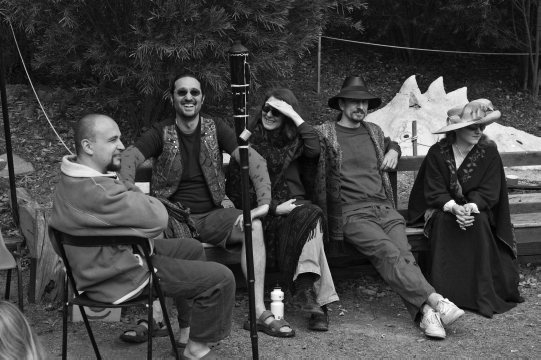
Photo by B. Dalton.
Phoebe and Harrison created and lead Faunalia. The quotes that open this Introduction describe their experiences of the Baphomet rite at the first Faunalia in 2000. Phoebe is 41-years-old and has been a Witch for nine years. Harrison is 47-years-old and has been a Witch for 25 years. Phoebe and Harrison are similar to most people who attend Faunalia. Participants tend to work in middle-class or service-sector occupations and are often married or in long-term relationships. Many are well-educated, although some have limited education. These people are attracted to Faunalia because it provides an intense and transformative emotional experience, a powerful moment of ritual engagement with the hidden core of their lives.
Next page
